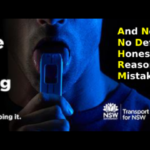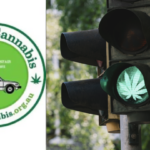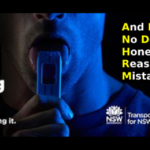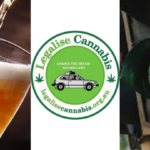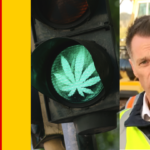Criminal Prosecutions Soar Under New South Wales’ Unjust Drug Driving Laws
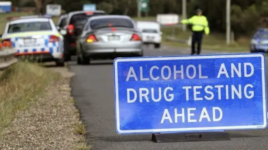
The Bureau of Crime Statistics and Research (BOCSAR) released a report on 23 October 2024 which found that the number of people charged with drug driving offences over the past decade has increased from 1,409 to 13,815 annually.
But notably, the BOCSAR concluded that, despite the 836% increase in prosecutions, ‘[t]here is no evidence that recent trends in drug driving charges are driven by changes in drug use or drug driving behaviours.’
And despite police claims that increased arrests and prosecutions equate to safer roads, the fact of the matter is drivers in New South Wales are routinely criminalised for having miniscule concentrations of illicit drugs in their systems – amounts that are incapable of impairing driving – including those prescribed medicinal cannabis who have not consumed the medicine for several days.
Indeed, the regime currently in place in our state means that – unlike many other jurisdictions around the world – a driver can be criminally prosecuted for any level of illicit drug in their bloodstream – a situation made worse by recent case law which determined the defence of ‘honest and reasonable mistake’ no longer applies to drug driving cases.
The Offence of Drug Driving in New South Wales
Driving with the presence of an illicit substance, which is also known as ‘drug driving’, involves driving with any concentration of illicit substance in your system, specifically MDMA (‘ecstacy’), methamphetamines (eg ‘speed’ and ‘ice’), cocaine and cannabis.
The prosecution is not required to prove the driver was affected by the drugs at the time of driving, only to prove the person had drugs in their system — thereby creating an unfair zero-tolerance rule.
For first offenders, police can choose to issue a driver an on-the-spot penalty notice (fine) which is currently $682 and 3-month licence suspension instead of sending them to court. A penalty notice is issued if the laboratory analysis shows a positive reading.
If police choose to take the matter to court, the penalty that applies on conviction is an automatic 6 month disqualification, which a magistrate can reduce to as low as 3 months and a fine of $2,200 for the first offence.
However, in the event the magistrate is persuaded to make a ‘non conviction order’, such as a section 10(1)(a) dismissal or conditional release order, there is no disqualification, no fine and no criminal conviction.
An Evidence Based Approach
Many jurisdictions including the United Kingdom, Norway, Germany and several of the United States have adopted an evidence-based approach, using specific levels and penalisation increases correlating to the concentration of drugs within the driver’s blood.
Instead of using an absolute liability offence where the prosecution does not have to establish a mental fault, and there are no defences to argue against the charge, an evidence-based approach can allow for possible defences.
The United Kingdom uses the impairment approach, with legislation that it is illegal to drive if a person a) is on legal or illegal drugs, or b) has certain levels of illegal drugs in their blood.
The levels of drugs for testing in the United Kingdom vary based on the type of drugs and the threshold limit in micrograms per litre of blood. For example, the threshold limit for cocaine is 10 µg/L, whereas cannabis is 2 µg/L.
In the UK, a blood specimen can only be collected if the forensic medical examiner can state that the driver is impaired through using drugs.
Similarly, Norway uses the ‘per se’ approach and provides driving level limits for 20 non-alcohol drugs. Behavioural cut-offs are set, which assumes that blood concentration levels higher than specific limits lead to impairment. On the same note, Germany legalised cannabis and created a THC driving level limit law.
Several of the United States have had to come up with an impairment approach that strikes a balance between justice for drug driving and morality, as legalising cannabis for medical and recreational purposes changed how police can enforce drug driving offences.
Certain states have created limits for cannabis present in the blood to provide measurable limits of how much will impair a person, which renders it illegal for them to drive a vehicle. Individual jurisdictions in the US use measurements such as ‘impaired to the slightest degree’, ‘standard of care as a sober person’, and other language that relates to the behaviour of the person at the time of the impaired driving.
Overall, multiple European countries, Canada, and the United States have a varying range of acceptable legal limits for illicit substances and alcohol present in a person’s bloodstream using an evidence based approach. The legal limits for THC in blood in European countries and New Zealand range from 0.5 to 3 µg/ml and 1-1 µg/ml in serum. The limits in the US and Canada are between 2 to 5 µg/ml in blood.
The legal limits for amphetamine and methamphetamine in New Zealand and Europe, except for the United Kingdom, ranging from 10 to 50 µg/ml in blood, with the United kIngdom having a limit of 250 µg/ml.
The penalties for violating the lower effect limits typically involve fines, driver suspension, drug education treatment programs, or treatment centres. A prison sentence may be applicable in more serious breaches of the allowable limits.
The Need for an Evidence-Based Approach
The interests of justice require an end to situations where drivers are criminalised for having less than impairment concentrations of drugs in their system – an approach similar to the one that has been adoped for decades when it comes to drink driving offences, and by EU countries including those of the United Kingdom, the United States and New Zealand.
Our reforms could draw upon existing programs elsewhere as well as continuing research. In regard to the latter, the European DRUID project is considering establishing two limits for an evidence-based approach: lower effect and risk threshold limits. Most European countries have established ‘lower effect limits’, allowing for a more practical approach with ever-changing laws.
The fact of the matter is drug driving laws in Australia are not based on evidence of impairment. Nor are they about road safety. Rather, they seem to be more about unfairly targeting and criminalising drug users by proxy – and, in that way, can be seen as part of our nation’s futile war against drugs.
So, the argument that reform is in the interests of fairness appears to be extremely strong, as that such change is long overdue – lest we continue to unfairly criminalise members of the community.
In the Context of Medicinal Cannabis
And perhaps the situation is even worse in the context of cannabis. In that regard, those who are prescribed medicinal cannabis can face drug driving charges even if they drive several days after having taken the plant, if miniscule concentrations of THC remain in the system, as they can certainly do.
Steve Bolt, a solicitor from Lismore, noted that ‘if (these) drugs are now for a significant part of the population being used lawfully, or legally under prescription, the argument (of punishment) falls away.’ He also noted that there was a high number of individuals who legally used cannabis and were falsely told the drug would leave their system before operating a vehicle — but tested positive in the police’s test anyway.
Charged with Drug Driving?
If you have been charged with a drug driving offence, contact Sydney Criminal Lawyers for accurate advice and strong legal representation from experienced traffic lawyers with a proven track record of achieving exceptional results.

